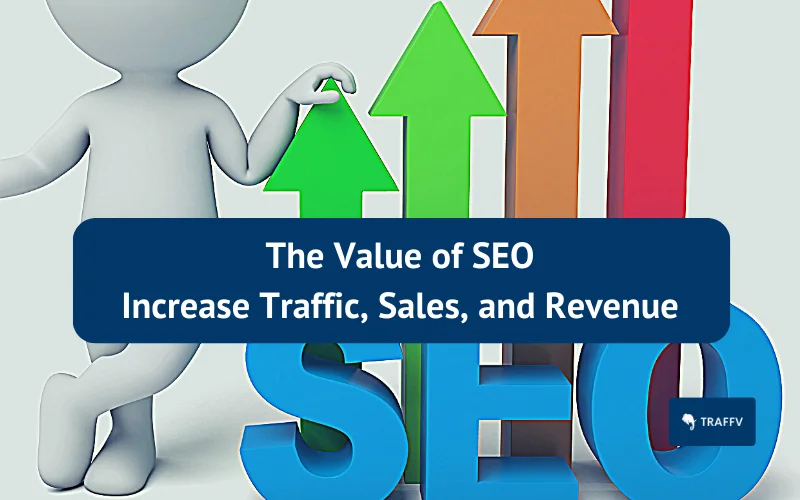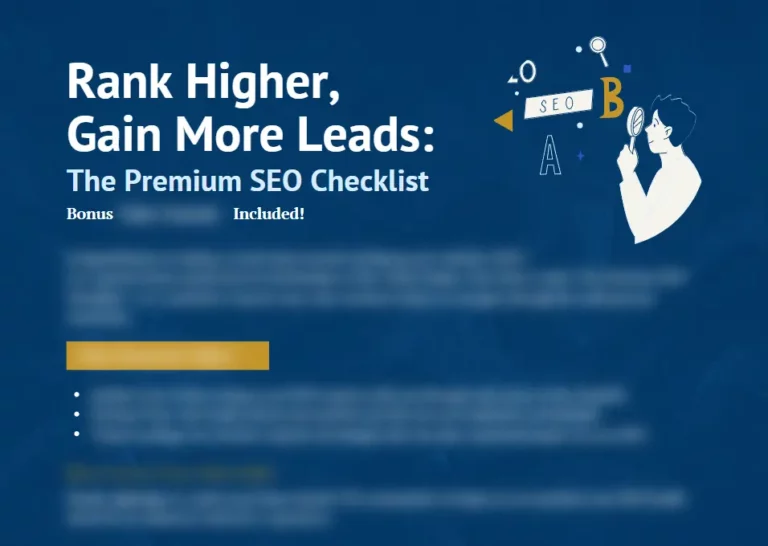Are you struggling to drive traffic, sales, and revenue?
The key to unlocking your business’s potential lies in understanding the power of search engine optimization (SEO).
It’s time to take your business to new heights by harnessing the incredible SEO value, the most cost-effective and sustainable marketing channel available.
So buckle up as we embark on a journey to uncover the secrets of SEO, from understanding major search engines and their guidelines to developing an effective SEO strategy and measuring its ROI.
Throughout this blog post, you’ll gain insights into the world of SEO, learn about the challenges and opportunities it presents, and discover how to leverage emerging trends to stay ahead of the competition.
TL:DR
- Understanding Search Engine Optimization is essential for increased visibility and organic traffic.
- Measuring SEO value involves analyzing key metrics, using the right tools, and optimizing website engagement metrics.
- Emerging trends such as mobile SEO enable businesses to stay ahead of algorithm updates and achieve long-term success.
Understanding Search Engine Optimization
SEO is the powerhouse behind driving traffic, sales, and revenue, requiring consistent efforts to achieve the desired SEO results.
Major search engines and their guidelines play a pivotal role in shaping SEO strategies, providing instructions on optimizing content for improved visibility in search engine results pages (SERPs).
By adhering to these guidelines and understanding the intricacies of SEO, businesses can draw more visitors to their websites, reach potential customers, and build brand recognition.
Content is king when it comes to SEO, and it must meet both technical and human requirements to increase search engine rankings and achieve desired outcomes.
Technical requirements include optimizing page speed, incorporating relevant keywords, and optimizing images.
On the other hand, human requirements involve producing content that is engaging, informative, and of superior quality.
By striking the perfect balance between these two aspects, your SEO efforts are bound to yield fruitful results.
Major Search Engines
Major search engines such as Google, Bing, and Yahoo play a significant role in determining search rankings and driving organic traffic.
These search engines use complex algorithms to crawl, index, and rank web pages based on various factors such as relevance, authority, and popularity.
As a result, optimizing your website for search engines is crucial to ensure higher rankings and increased visibility.
URLs are an essential component of SEO, helping search engines understand the content of a post.
Including one or two relevant keywords in the URL can improve SEO, while removing unwanted elements such as dates and categories can make the URL more concise and user-friendly.
By optimizing your URLs and adhering to search engine guidelines, you can enhance your website’s search performance and drive more organic traffic.
Search Engine Guidelines
Compliance with search engine guidelines is essential to guarantee sustained SEO success and avert penalties.
These guidelines serve as a roadmap for creating and optimizing content that meets search engine standards and user expectations.
One crucial aspect of adhering to search engine guidelines is crafting compelling and informative meta descriptions that encourage searchers to click and read your content, even though they do not directly impact SEO rankings.
Title tags, another vital element of SEO, should include the relevant keyword to improve search rankings.
Moreover, website engagement metrics, such as bounce rate and average time on page, provide a link between search optimization and user engagement, helping businesses understand how their SEO and content strategies contribute to expertise, authority, and trustworthiness.
By following search engine guidelines and optimizing these elements, businesses can ensure long-term SEO success.
Measuring SEO Value: Key Metrics and Tools
In order to gauge the effectiveness of your SEO efforts, it’s crucial to measure key SEO metrics and utilize the right tools.
Essential metrics and tools for assessing SEO value include Google Analytics and web page optimization techniques.
Analyzing these metrics allows businesses to identify areas of improvement, fine-tune their SEO strategies, and ultimately achieve better search rankings and higher organic traffic.
Attribution models, website engagement metrics, and branding metrics are some of the widely-used data points to measure SEO value.
These metrics provide insights into the performance of your content and its impact on corporate, PR, or internal marketing objectives.
By leveraging this data, businesses can make informed decisions and optimize their SEO strategies for maximum results.
Google Analytics
Google Analytics is a powerful tool that provides the capability to track and evaluate essential SEO metrics like organic traffic, bounce rate, and conversion rate.
By integrating your Google Analytics and Search Console data into an SEO platform like seoClarity, you can gain a comprehensive overview of your website’s performance and identify opportunities for improvement.
Monitoring organic traffic through Google Analytics is crucial to gauge the success of your SEO efforts and the overall growth of your website.
Analyzing this data can help businesses understand the effectiveness of their SEO strategies, identify trends, and make data-driven decisions to optimize their websites for better search rankings and increased organic traffic.
Web Pages Optimization
Optimizing web pages for both search engines and users is beneficial as it increases SEO value and enhances user experience.
Web page optimization involves enhancing a website’s performance, speed, and user experience by optimizing web design, adding relevant keywords, images, meta-tags, and internal and external links.
The advantages of website optimization include improving user experience, increasing traffic, and conversions.
To optimize web pages effectively, businesses should focus on improving page loading speed, enhancing the user experience, and ensuring that the content is optimized for search engine visibility.
By implementing these techniques, businesses can improve their website’s search rankings, drive more organic traffic, and ultimately boost their online presence.
Developing an Effective SEO Strategy
Developing an effective SEO strategy is vital to harness the full potential of SEO and achieve significant business growth.
By conducting a customer persona deep dive and understanding the importance of keywords in SEO, businesses can identify the most beneficial keywords for their target audience and create a comprehensive marketing plan.
It is suggested to use keywords with a reasonable search volume, as a monthly search volume of less than 100 is unlikely to be effective.
A well-crafted SEO strategy should encompass keyword research, on-page and off-page optimization techniques, and the continuous monitoring and analysis of key metrics.
By following these steps and adapting to the ever-changing search engine landscape, businesses can achieve higher search rankings, increased organic traffic, and a more robust online presence, ultimately leading to increased sales and revenue.
Keyword Research
Keyword research is a fundamental aspect of crafting an efficient SEO strategy, as it enables businesses to recognize worthwhile search terms and comprehend user intent, directing specific traffic to their websites.
Tools like Google Ads Keyword Planner can be instrumental in identifying keywords for organic search and paid advertising, providing valuable insights into search volume, competition, and potential ROI.
Understanding keyword intent is crucial for creating an editorial calendar that caters to customers at different stages of the buyer’s journey.
By populating your editorial calendar with content that assists customers in each step, businesses can effectively target their audience, drive more organic traffic, and ultimately convert visitors into loyal customers.
On-Page and Off-Page SEO
On-page SEO refers to the optimization of website components such as content, HTML, and website architecture to improve search engine rankings and generate organic traffic.
Off-page SEO, on the other hand, focuses on external factors such as building high-quality backlinks, social media marketing, and online reputation management.
Implementing both on-page and off-page SEO techniques can enhance search rankings, augment organic traffic, and amplify brand visibility.
Formulating SEO content based on data is essential for achieving better search engine rankings and increased organic traffic.
Businesses should analyze their website performance, user engagement metrics, and competitor analysis to identify areas of improvement and create content that resonates with their target audience.
By combining data-driven insights with creative content strategies, businesses can effectively optimize their websites for both search engines and users.
Boosting Organic Search Performance
Creating high-quality, relevant, and engaging content is the cornerstone of boosting organic search performance.
By satisfying both search engines and users, businesses can improve their search rankings, drive more organic traffic, and ultimately increase sales and revenue.
Capturing SERP features, such as Answer Boxes and images, and optimizing content for branded traffic can further augment overall search visibility, helping businesses capture the demand generated by other marketing channels.
Staying informed about the evolving search engines and SEO reporting is vital for the company’s long-term success.
By monitoring the latest developments, investing in SEO tools, and creating content optimized for search engine visibility, businesses can remain ahead of the curve and continuously improve their organic search performance.
This, in turn, will lead to increased brand recognition, new customer acquisition, and sustainable business growth.
The ROI of SEO Investment
The return on investment (ROI) of SEO can be demonstrated through increased organic traffic, higher search rankings, and improved conversion rates.
Allocating value to SEO is a key factor in determining the return on investment of your SEO campaign.
Organic keyword ranking, for instance, can yield up to ten times the ROI of the SEO investment, making it an incredibly cost-effective marketing channel.
Acquiring new visitors is critical for the success of any website, as it demonstrates the introduction of new prospects to the business and is essential for brand growth.
By investing in SEO, businesses can increase their website traffic, generate new leads, and provide a marketing approach that can adapt to industry trends and algorithms.
The value of SEO work, estimated to provide a return on investment of 3-5 times the cost, is widely recognized by SEO experts.
Challenges and Opportunities in SEO
Adapting to search engine algorithm updates and staying ahead of emerging SEO trends are among the challenges and opportunities associated with being an SEO professional.
They must contend with Google algorithm updates, sudden changes in rankings, competing with Google SERP features, and the effects of global crises on search behavior.
Despite these challenges, SEO offers a variety of opportunities, such as driving more traffic, increasing sales, and improving revenue with techniques like keyword research, on-page and off-page SEO, and optimizing organic search performance.
By remaining informed of emerging SEO trends and adjusting their strategies accordingly, businesses can sustain a competitive advantage in the digital realm.
This involves monitoring the latest developments, investing in SEO tools, and creating content optimized for search engine visibility.
By embracing these challenges and opportunities, businesses can unlock the full potential of SEO and achieve remarkable growth.
Search Engine Algorithm Updates
Search engine algorithm updates refer to modifications made to the algorithms utilized by search engines to rank websites in search results.
These updates can have a considerable effect on SEO strategies and can occur multiple times a year. Google’s algorithm updates encompass broad core algorithm updates, which indicate a broad change in how Google’s algorithm ranks pages and sites.
To successfully navigate search engine algorithm updates and effectively optimize search rankings and organic traffic, businesses should continuously monitor and adapt their SEO strategies.
This involves staying informed about the latest developments, investing in SEO tools, and creating content that adheres to search engine guidelines.
By doing so, businesses can maintain and improve their search rankings and organic traffic, even in the face of frequent algorithm updates.
Emerging SEO Trends
Currently, the trends in SEO include mobile SEO, zero-click search, voice search, intent content, video content, core web vitals, AI-powered SEO automation, and user experience optimization.
Moreover, targeted keywords remain essential for SEO in 2023.
Additionally, answer engine optimization (AEO) has emerged as a new type of optimization alongside SEO.
Remaining informed of emerging SEO trends is essential for sustaining a competitive advantage in the digital realm.
By incorporating these trends into their SEO strategies, businesses can stay ahead of the competition and continuously improve their search rankings and organic traffic.
Embracing these emerging trends enables businesses to adapt to the ever-changing digital landscape and achieve long-term success.
Embrace the Future with Strategic SEO Investments
The power of SEO lies in its ability to unlock a business’s potential and propel it towards remarkable growth.
By staying informed about the latest developments, investing in SEO tools or SEO service, and creating content that adheres to search engine guidelines, businesses can maintain a competitive edge in the digital landscape and achieve long-term success.
The future of your business lies in harnessing the incredible value of SEO – are you ready to seize the opportunity?
Frequently Asked Questions
How do you show SEO value?
Demonstrate SEO value through an ROI model, paid search data, reporting, testing budget and competitor wins.
Showing tangible evidence of the benefits of SEO will prove its worth to stakeholders.
What does SEO means?
SEO stands for Search Engine Optimization and is the process of improving a website’s visibility, relevance, and link popularity to increase its rank in search engine results.
Why is SEO valuable?
SEO is valuable as it optimizes visibility online, allowing brands to rank highly on search engine results pages and attract potential customers.
It is also essential for making websites discoverable by search engines and driving organic traffic through relevant content.
Ultimately, SEO is key to increasing website visibility, resulting in more website traffic and opportunities to convert prospects into customers.
What is the significance of SEO in driving traffic, sales, and revenue?
SEO is vital for increasing traffic, sales, and revenue, as it requires consistent effort in order to be successful.
It is important to understand the basics of SEO and how to use it to your advantage. This includes researching keywords, optimizing content, and building backlinks.
Additionally, it is important to stay up to date.
What challenges and opportunities arise from SEO?
SEO presents both challenges and opportunities, such as staying up-to-date with algorithm changes and taking advantage of new trends.




